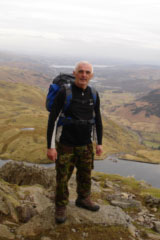I’m 57, and I’ve always kept fairly active. Then in August 2003, I started feeling really tired. The doctor said it was iron anaemia, so they put me on a course of iron tablets. Six months later I had to have a gastrointestinal endoscope to investigate acid reflux, and they said I was losing a bit of blood because of that. But my GP wasn’t convinced – he sent me for a colonoscopy in December 2004. During the colonoscopy, they found a tumour in the colon. This was the real cause of the blood loss which was making me tired.
My bowel operation to remove the tumour was on New Year’s Eve 2004 – a quiet New Year’s Eve, as you can imagine. We didn’t know then that there were also 11 tumours on my liver. My colon surgeon at Nevill Hall Hospital in Abergavenny, Mr Delicata, has said since that a lot of people wouldn’t have attempted the bowel operation knowing how many tumours I had in the liver.
In the February six weeks after my colon op, I went to see the oncologist, Dr. Iqbal. He said I had ‘grade 1’ liver cancer. Immediately I thought ‘grade 1’ was the worst cancer, and thought the worst. It isn’t though – it was a misunderstanding. It’s hard to take it all in when you’re meeting with the doctor.
When they discovered the liver tumours, Dr Iqbal and Mr. Delicata contacted the liver surgeon Mr Merv Rees in Basingstoke. They sent the scan to him at 1pm. At 5pm Mr Rees came back and said he’d do the liver resection required. I had my first liver operation in July 2005 at Basingstoke Hospital, after having a course of six cycles of chemotherapy. Mr Rees said my liver resection was quite a difficult one. I’ve had three further liver resections since. Each time I come to Basingstoke to see Mr Rees – I don’t want to break that habit now!
I’ve had chemotherapy three times in all. The first was in the spring of 2005, after my colon surgery and before my liver operation. I flew through that. The second series was in the winter of 2005. At the end of that I was a bit tired. The third series was two years ago, between Sep-Dec 2009. This made me more tired – apparently there is a cumulative effect with chemotherapy. The tingling hands were worse than previously, but were improved by keeping them out of the cold for the first few days. But it didn’t stop me doing things – I have even paraglided with the chemo pump on, strapped to my side.
If you worry, you’re wasting time – that’s been my philosophy. I get a little bit apprehensive when I have a routine scan, every three months. The worst bit is when I get in the room with the doctor, who’s looking at the scan, and I’m waiting for the doctor to say something. He might be looking at it for 10 seconds before talking, but that 10 seconds seems to take the longest time…
I just get on with life – after each scan, once you know either way, life goes on. I think a positive mental attitude is a lot of help – I think the body and mind are far more linked than we know. I’m still living a very active life. I love where I live in the South Wales Valleys, on the edge of the Black mountains near the Brecon Beacons. I live in Blaenafon, the World Heritage town, just down the hill from the Big Pit mining museum at the head of the most easterly valley of the South Wales coal field. There are lots of open mountains, woodlands and moorland. I love hill-walking, mountain-biking, motorbiking and paragliding.
Sometimes the scar hurts – it’s worse if I sit down. I develop websites part-time for small businesses and individuals. My scar plays up sometimes when I’m at the computer. But normally when I’m active it’s OK. When people see the scar I like to say it’s a shark bite – you’d be amazed how many people believe that.
You’re wasting time not to live life. I’m enjoying life with my partner Jill, a social worker. I paraglide whenever I can, weather permitting. I was a fabricator and welder previously – now I’m building a teardrop caravan, 8ft by 4ft, at home. I’ve just bought a Mazda MX5 – growing old disgracefully.
Myself and five friends from our local pub (The Queen Victoria, or ‘the Queens’) got together to raise £1500 for the liver fund in Basingstoke last May, by cycling from Blaenafon to the Ark in Basingstoke (the Ark houses the liver research office, funded by the Pelican Cancer Foundation). I’ve got to know a few other patients who’ve had liver resections under Mr Rees, and we provide each other with support. It was great to meet up with them at the ‘2000th resection’ get together with Mr Rees at the Ark last September. I’m happy to do anything I can to help – I can never repay what’s been done for me.
Interview with Terry Davies, July 2011.

